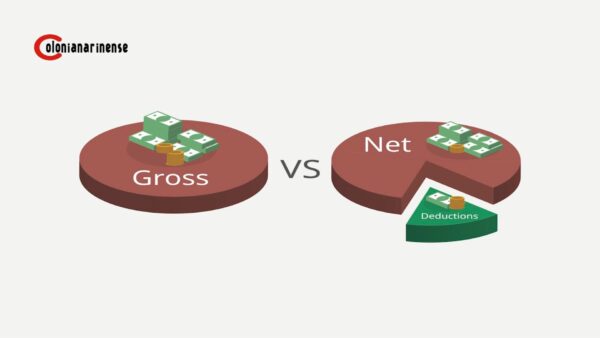When someone mentions their salary or how much they earn, it’s often unclear whether they’re referring to their gross pay or net pay. Chances are, most people talk about their gross pay simply because explaining net pay can get a bit complicated. So, if you’re feeling unsure about these terms, don’t worry—you’re not the only one! Many people find the difference between gross and net pay confusing. If you’re curious about what these salary terms mean, you’re in the right place. In this article, we’ll break down the concepts of gross and net pay and explain how they differ. Let’s dive in!
What is Gross Pay?
When we talk about gross pay, think of it as the total amount of money you earn before any deductions are made. It’s the full figure your employer agrees to pay you for your work. For instance, if you earn Rs.300 per hour and work 40 hours in a week, your gross pay for that week would be Rs.12,000 (Rs.300 x 40). This doesn’t include any extra income, such as overtime or bonuses, which would be added to that total. However, when you check your bank account, you’ll notice that the amount you actually receive is lower than your gross pay. That’s because deductions have been made, which we’ll get to in a moment. But for now, just remember that gross pay is your total earnings before anything is taken out.
What is Net Pay?
Now, let’s move on to net pay. Net pay is the amount of money you take home after deductions. Think of it like this: your gross pay is like a whole pie, but before you get to enjoy it, you have to give up a few slices for various reasons. These “slices” can include taxes, health insurance, retirement contributions, and other deductions. What’s left after these deductions is your net pay—that’s the amount you actually get to keep and use for your expenses, savings, or anything else.
How Gross Pay and Net Pay Are Calculated
So, how do we go from gross pay to net pay? Let’s break it down:
Gross pay is essentially your total earnings before deductions. If you’re paid by the hour, you can calculate it by multiplying the number of hours you worked by your hourly rate. If you have a set salary, your gross pay is the agreed-upon amount between you and your employer.
But that’s just the starting point. From this gross pay, certain amounts are deducted before you see your paycheck. These deductions typically include:
- Taxes: These can be federal, state, or local taxes, depending on where you live.
- Health Insurance: If you have a health plan through your employer, part of the premium is deducted from your gross pay.
- Retirement Contributions: Money set aside for your retirement, such as into a 401(k) or provident fund.
- Other Deductions: This could include union fees, charitable contributions, or any job-related expenses.
Once all these deductions are made, what remains is your net pay. This is the actual amount that gets deposited into your account—the money you can use to cover bills, groceries, or a little treat for yourself!
Understanding the Importance of Gross and Net Pay
Why should you care about the difference between gross and net pay? Well, understanding these terms is essential for managing your finances. Your gross pay gives you an idea of your overall earnings and potential income, but it’s your net pay that matters most for day-to-day budgeting. Knowing your net pay helps you plan how much to spend, save, and invest.
It’s also crucial to know your gross pay when it comes to taxes. This is the figure the government uses to determine how much tax you owe. By being aware of both your gross and net pay, you’ll avoid any surprises when tax season rolls around.
Common Misunderstandings
Many people assume that the salary they’re offered is the amount they’ll take home, but that’s not the case. When you see your paycheck, it’s often less than expected because of the deductions that have been made. While some deductions, like taxes, are mandatory, others—like retirement contributions or insurance—might be optional, giving you some flexibility in how much is taken out.
Key Differences Between Gross Pay and Net Pay
To make the comparison clearer, here’s a quick overview of the key differences between gross and net pay:
| Category | Gross Pay | Net Pay |
|---|---|---|
| Definition | The total earnings before any deductions or taxes. | The amount you take home after all deductions and taxes. |
| Calculation | Gross Pay = Hourly Rate x Hours Worked + Bonuses + Overtime | Net Pay = Gross Pay – Taxes – Deductions |
| Components | Hourly or Salary Rate, Bonuses, Overtime, Additional Income | Taxes (Federal, State, Local), Social Security, Medicare, Retirement Contributions, Health Insurance Premiums, Other Deductions |
| Purpose | Determines your total earnings and compensation package. | Represents the actual amount you receive in your paycheck. |
| Importance | Useful for understanding your earning potential and budgeting. | Crucial for managing daily expenses, savings, and financial planning. |
Conclusion
And there you have it—a breakdown of gross pay versus net pay. Now you should have a clear understanding of what these terms mean and how they differ. Whether you’re planning your budget or preparing for tax season, knowing the difference between gross and net pay is key to managing your finances more effectively. Keep these insights in mind, and you’ll be better prepared to navigate your financial journey with confidence.



